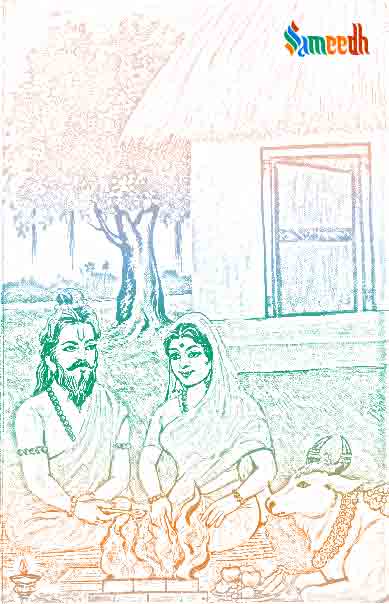Significance, life journey and teachings of sage Vashisht’s wife

Arundhati is the wife of one of the first Hindu sages, Vashishtha, out of the seven or saptarishi. She is not known just as a rishi’s wife but is also a saint herself. There is an entire Hindu epic poem written for Arundhati, describing her life and major occasions. The poem goes by her name itself and was composed by Jagadguru Ramabhadracharya in the year 1994.
In the Hindu month of Chaitra. On the second bright day, many women in India are seen to observe a fast to honour Arundhati. This fast is kept by married women whose husbands are still alive in order to ensure a long life for their husbands so the women could not be widowed soon.
Early life
Arundhati was Kardama and Devhuti’s eighth daughter out of nine. She then later in her life also becomes the great grandmother to Vyasa, the author of the great Indian epic Mahabharat. It is also believed that she went by the name Sandhya, manasputri, or mind born daughter, of lord Brahma, god of creation, himself. Such was the vastness of knowledge associated with her. Sandhya was once instructed by Vashishta himself to please lord Shiva, god of destruction, by seeking penance and washing herself off her passion and desires. Shiva asked her to jump into the fire of Medhatithi, commentator of Manus smriti or laws of Manu. In her rebirth, she was born as Medhatithi’s child and went on marrying Vashishtha.
It is known that sage Vashishta harboured animosity towards another sage Vishwamitra. During their hostile back and forth battles, Vishwaitra had cursed Arundhati that she shall lose all her one hundred sons which she does. She does bear two sons by the name of Shakti and Suyagya who become lord Ram’s classmates while studying at Vashishta’s retreat.
Arundhati’s dedication can be understood through various incidents which showcase her meditative powers and firm belief. Once it had happened such that it did not rain for 12 years straight. This naturally affected the growth of crops. The sages or Brahmins used to rely solely on fruits and roots to consume as they derived their energies and powers from there. The drought-like condition made the sages suffer and it was then Arundhati took up the initiative to do something. With her extreme devotion, knowledge, spiritual powers and purity, she seeked penance from lord Shiva himself. Seeing her determination, focus and willingness to put an end to the sage’s menace, Shiva finally made it rain, promoting crop growth.
Twin star system
The names Arudhati and Vashishtha have been coined when a twin star system was discovered in the Universe. The small spots in that system were named as such. The spots were otherwise known as Mizar and Alcor, which were represented as Vashishtha and Arudhati respectively according to Indian astronomy. As it is a pair, it is equated with marriage or the union of two souls. Arundhati and Vashishtha were deemed to be the ideal pair, perfect couple symbolising marriage, loyalty and contentment through bonds. In Hinduism, during the marital ceremonies, the groom shows these stars to the bride so as to recreate such closeness and invite the harmonious bonds into their new married lives.
In the majority of the twin star systems, one star rotates around the other. But in this case, Arundhati and Vashishta rotate in synchronisation. This depicts how solely women or men are not supposed to rotate around their partners catering to their whims and wishes. Instead, a peaceful bond should be established where both the husband and wife are in sync, having their own independence and yet coordinating with each other and their lives.